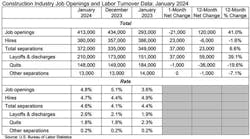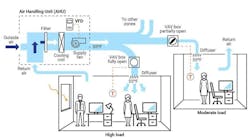Throughout my career, it has always seemed that a promotion into management is viewed as a reward for performing extremely well. Occasionally this works, but all too often the reward seems more like punishment.
Far too many times I’ve seen a high performing salesman promoted from a job that was a sure thing into management only to see him or her fail miserably. As a result, the company has lost a large amount of revenue from their performance, and potentially by losing the employee.
Conversely, if a career path is not presented, some valuable employees will stagnate and ultimately reach burn-out. An apprentice technician should know what is expected to get through the apprenticeship and become a journeyman. Clerical employees should be viewed as potential administrative assistants while truck drivers should be looking an apprenticeship and sales personnel moving toward sales management.
Assessing HVAC Potential During the Interview
The entire process of building career paths should begin in the interviewing process. Hiring managers should be assessing future potential, and not just what the applicant brings to the position they are applying for. Academic achievements, past experience, personal presence and communicative skills will shed insight as to possible career development. The manager should discern where the candidate aspires to be in the coming months and years.
A plan should be established soon after a new employee hits the ground.
A plan should be established soon after a new employee hits the ground. This should include the education process, time on the job spent with other more experienced employees, and the establishing of the associated time frames. This gives the employee a sense of being in control of their destination while performing in their present role. When conducting the annual employee evaluation session, an assessment should be made as to the completion of each step. This will assure that the employee is on target for their future aspirations.
As always, there are very few things that are black and white in managing personnel. When management is convinced that an employee is totally satisfied in their present position and they are performing at acceptable levels, it may be time to back off. This situation exists with many veteran sales persons. They score remarkable numbers year after year and are very content in continuing down that path.
Pay raises alone will not sustain total job satisfaction.
I use sales as an example of this because selling is the most measurable job in the organization. Heavy hitters get their satisfaction in simply over-achieving. Upward mobility can still be provided within the ranks of professional sales by developing a compensation plan and corresponding promotional levels of advancement. An entry level sales person would start as a sales trainee. Moving through this slot quickly (typically in six months), their first promotion would be to sales person. From there, a promotion would lead to senior sales and ultimately account executive. Each level would have a base salary range from low to high. This allows merit increases within the pay level and promotions to a higher level when the performance exists. I recommend a brief job description be developed for each level, so the sales person realizes that the promotion carries additional responsibilities.
Pay raises alone will not sustain total job satisfaction. A savvy manager will learn to recognize dissatisfaction early enough to redirect the employee. Recognizing that quality, highly motivated employees drives the entire organization, it’s worth the time and management effort to retain them.
Earl King is the founder of King Productions International, a commercial HVAC contracting sales consulting firm based in Texas. He speaks to associations and HVAC trade groups, and consults with commercial contractors across the country. E-mail Earl at: [email protected] or call him at 515/321-2426.







